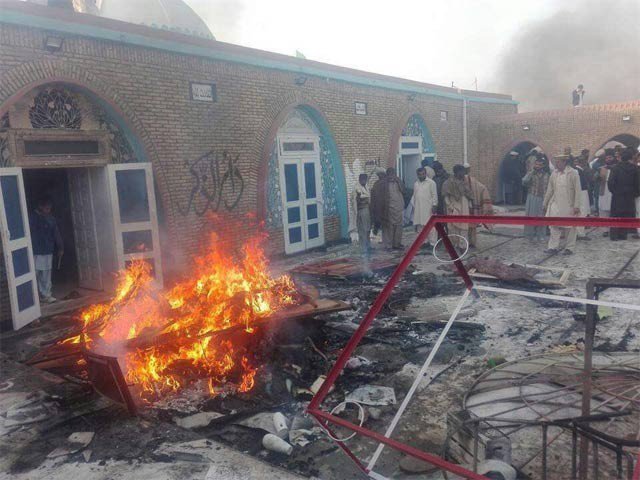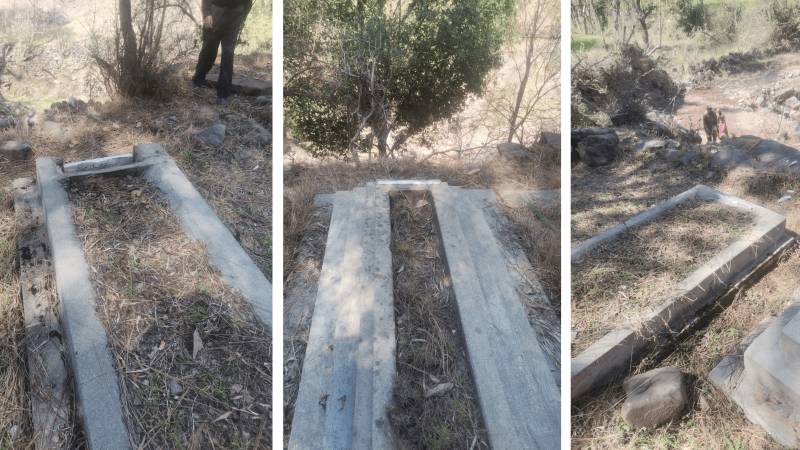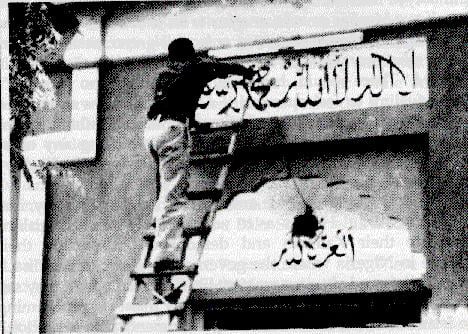The Ahmadiyya Muslim community, often referred to as Ahmadi Muslims, continues to face persistent persecution while steadfastly upholding their faith. With a population of approximately 500,000 in Pakistan, they grapple with discrimination despite their unwavering belief in Islam.
Recent events have highlighted the challenges faced by the Ahmadiyya community, including the desecration of tombstones at a designated cemetery in Kotli, Pakistan-Occupied Jammu, and Kashmir. Between the nights of March 7 and 8, at least eight tombstones were partially or completely damaged, reflecting a distressing resurgence in targeted incidents.

In a statement, a community spokesperson expressed deep concern, stating, “The hateful activities are reaching heights that will inevitably be beyond repair.” The spokesperson also pointed to a recent attack on an Ahmadiyya mosque in Kotli, where minarets were damaged. The community urgently calls on authorities to take concrete steps to protect them from hostile elements.
Tragically, the assassination of Tahir Iqbal, the president of the Ahmadiyya Muslim Community in Hasilpur, district Bahawalpur, adds to the distressing narrative. Iqbal was shot dead during his morning walk in Chak-84 village, with initial police reports suggesting a motive related to “honour”. The Ahmadiyya Muslim community condemned the killing, linking it to the ongoing wave of hatred and violence against Ahmadi Muslims in Pakistan.

Despite their significant presence and contributions to society, Ahmadi Muslims in Pakistan face legal and societal challenges and dangers. The country’s constitution does not recognize Ahmadi Muslims as Muslims, and they encounter discrimination in various aspects of life. This discrimination extends to restrictions on their religious practices, including the prohibition on entering mainstream mosques, even calling their own mosques the mosque.
With approximately 500’000 Ahmadi Muslims residing in Pakistan, their plight underscores the urgent need for international attention. The community’s members often receive death threats from extremist groups, pushing some to seek refuge in other countries.
The history of the Ahmadiyya Muslim community dates back to 1889 when the movement emerged in Ludhiana, Punjab, India. Despite their peaceful teachings and commitment to Islam, Ahmadis, native to Pakistan, find themselves marginalized and persecuted in their own country.
Amidst the challenges and persecution, it is essential to acknowledge the extensive humanitarian efforts undertaken by the Ahmadiyya Muslim Community on a global scale. Beyond the confines of adversity, the community is renowned for its commitment to fostering peace, tolerance, and charity. The Ahmadiyya Muslim Community has been actively engaged in philanthropic endeavors, providing aid in response to natural disasters, establishing schools and hospitals, and promoting interfaith dialogue. Their dedication to humanitarian causes reflects the essence of Islam, emphasizing compassion and service to humanity. Despite facing adversity, the Ahmadiyya Muslim Community continues to contribute positively to societies worldwide, embodying the principles of love, compassion, and selfless service.

Ghana: The Ahmadiyya Muslim Community in Ghana plays a vital role in promoting education and healthcare. With a strong focus on community development, they have established schools and hospitals, contributing significantly to the well-being and education of local populations.
Burkina Faso: In Burkina Faso, the Ahmadiyya Muslim Community actively engages in humanitarian efforts, providing aid and support to those affected by crises. Their commitment to alleviating suffering and fostering unity underscores their dedication to the principles of Islam.
Nigeria: The Ahmadiyya Muslim Community in Nigeria is dedicated to both spiritual and societal upliftment. Through educational initiatives, they empower individuals to contribute positively to society, fostering a sense of responsibility and service.
Ivory Coast: In Ivory Coast, the Ahmadiyya Muslim Community emphasizes the importance of peace and harmony among diverse religious communities. Their efforts in promoting interfaith dialogue contribute to a more tolerant and cohesive society.
UK: The Ahmadiyya Muslim Community in the United Kingdom actively participates in local community service, promoting understanding and cooperation. Their engagement in charitable projects and social outreach reflects their commitment to fostering unity and compassion.
India: The Ahmadiyya Muslim Community in India contributes to the nation’s social fabric through educational and healthcare initiatives. Their commitment to serving humanity aligns with the teachings of Islam, emphasizing the welfare of all members of society.
These examples showcase the diverse and impactful humanitarian efforts of the Ahmadiyya Muslim Community across different regions, reflecting their commitment to embodying the principles of Islam in practice.
The Ahmadiyya Muslim Community is renowned for its commitment to humanitarian projects worldwide, reflecting its core values of service, compassion, and community development. Some of the community’s most significant projects encompass a wide range of initiatives, including education, healthcare, disaster relief, and interfaith dialogue.
1. Humanity First International: One of the community’s flagship initiatives, Humanity First International, operates globally to provide humanitarian aid and development projects. This includes disaster relief efforts, healthcare initiatives, and educational programs aimed at empowering communities in need. From building schools and hospitals to delivering emergency aid during natural disasters, Humanity First exemplifies the community’s dedication to global well-being.
2. Nasir Hospital in Guatemala: In Guatemala, the Ahmadiyya Muslim Community established the Nasir Hospital, providing essential healthcare services to underserved communities. The hospital addresses medical needs, including surgeries, consultations, and maternal care, making a significant impact on the health and well-being of the local population.
3. Nusrat Jehan Scheme for Orphans: To address the needs of orphaned children, the Ahmadiyya Muslim Community has implemented the Nusrat Jehan Scheme. This initiative focuses on the holistic development of orphaned children, providing them with education, healthcare, and emotional support to ensure a brighter future.
4. MTA International – The Muslim Television Ahmadiyya: MTA International serves as the community’s global television network, broadcasting programs that promote education, understanding, and interfaith dialogue. This platform plays a crucial role in disseminating the peaceful teachings of Islam and fostering a better understanding of the Ahmadiyya Muslim Community’s values and contributions.
5. Educational Institutions: The community has established numerous schools and colleges worldwide, fostering education as a means of empowerment. These institutions aim to provide quality education, promote moral values, and contribute to the intellectual development of students.
These projects underscore the Ahmadiyya Muslim Community’s commitment to humanitarian service and its belief in addressing the multifaceted needs of communities globally. Through these initiatives, the community continues to make a positive impact, embodying the Islamic principles of compassion, justice, and societal welfare.


